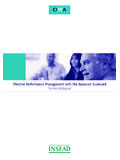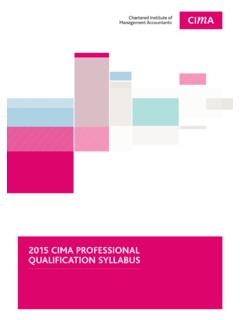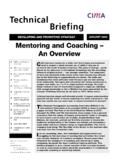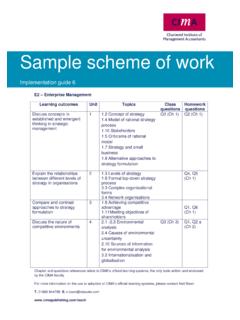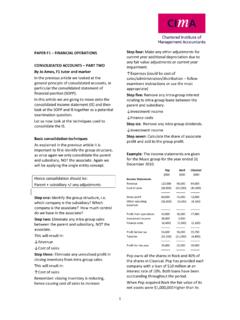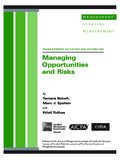Transcription of Strategic position - CIMA
1 Topic Gateway Series Strategic position Strategic position Topic Gateway series no. 44. 1. Prepared by Gillian Lees and Technical Information Service March 2008. Topic Gateway Series Strategic position About Topic Gateways Topic Gateways are intended as a refresher or introduction to topics of interest to CIMA members. They include a basic definition, a brief overview and a fuller explanation of practical application. Finally they signpost some further resources for detailed understanding and research. Topic Gateways are available electronically to CIMA Members only in the CPD. Centre on the CIMA website, along with a number of electronic resources.
2 About the Technical Information Service CIMA supports its members and students with its Technical Information Service (TIS) for their work and CPD needs. Our information specialists and accounting specialists work closely together to identify or create authoritative resources to help members resolve their work related information needs. Additionally, our accounting specialists can help CIMA. members and students with the interpretation of guidance on financial reporting, financial management and performance management, as defined in the CIMA. Official Terminology 2005 edition. CIMA members and students should sign into My CIMA to access these services and resources.
3 The Chartered Institute of Management Accountants 26 Chapter Street London SW1P 4NP. United Kingdom T. +44 (0)20 7663 5441. F. +44 (0)20 7663 5442. E. 2. Topic Gateway Series Strategic position Strategic position Definition The Strategic position is concerned with the impact on strategy of the external environment, internal resources and competences, and the expectations and influence of stakeholders. Together, a consideration of the environment, Strategic capability, the expectations and the purposes within the cultural and political framework of the organisation provides a basis for understanding the Strategic position of an organisation. Johnson and Scholes, 2005.
4 It is important to take account of the future and to assess whether the current strategy is a suitable fit with the Strategic position . If not, the organisation needs to determine what changes it needs to make and whether it is capable of effecting such changes. In summary, the Strategic position forms an integral part of the Strategic management process. It informs the Strategic choices that need to be made and subsequently implemented. Context In the current syllabus, CIMA students will learn and may be examined on this topic in paper 6, Management Accounting, Business Strategy and paper 10, Test of Professional Competence in Management Accounting (TOPCIMA).
5 Related concepts TM. CIMA Strategic Scorecard ; competitor analysis; benchmarking; Strategic planning;. corporate strategy. TM. Related topic gateways are the CIMA Strategic Scorecard , Key Approaches and Trends in Strategy and Strategic Analysis Tools. 3. Topic Gateway Series Strategic position Overview As indicated above, there are three key aspects of Strategic position , all of which have a powerful influence on the organisation's strategy: the external environment the organisation's Strategic capability in terms of its resources and competences culture and ethical values of the organisation and stakeholder influences. The real art of understanding Strategic position is in being aware of the linkages between these three aspects, how they change over time and how they can be integrated to create value.
6 Johnson and Scholes point out that a successful organisation will have found a way of operating such that environmental forces, organisational resources and competences, and stakeholder expectations mutually reinforce one another' (ibid). The crucial point to remember is that the best understanding of the Strategic position counts for nothing unless the organisation can use the knowledge effectively to develop and implement a successful strategy. Prior to the 1990s, Strategic management tended to focus on the interface between strategy and the external environment in which the organisation operated. However, during the 1990s, the emphasis shifted towards internal factors or the resource based view' which stressed the role of the organisation's resources and capabilities as the principal basis for its strategy.
7 The organisation can exploit its unique collection of resources and competences to gain competitive advantage and in a way that is difficult for competitors to imitate. Application There are a number of tools and techniques that organisations can use to understand their Strategic position . Many are listed in the Strategic Planning topic gateway. In respect of Strategic position , it is important that: The organisation needs to use the resulting information effectively. It needs to be discussed, debated and challenged so that the implications can be understood. 4. Topic Gateway Series Strategic position The organisation might need to develop its own tools and techniques to understand its position effectively.
8 The tools and techniques listed below are only a means to an end. What really matters is that understanding the Strategic position should help the organisation to formulate and implement a successful strategy. The organisation should not paralyse itself through analysis. It may be best to select just a few tools and stick to those. Understanding the Strategic position should not be an intense one off exercise associated with the annual Strategic planning cycle. Instead, it should be thin but ongoing. Some issues, such as competitor information, will need to be reviewed at least monthly. Understanding the external environment Organisations need to understand the external environment in terms of: macro influences these include political, economic, technological and social factors micro influences factors specific to the particular industry and related industries, including competition, customers, suppliers and barriers to entry.
9 The STEEPLE framework This approach reviews current and future aspects of the external environment based on categories such as social, technological, economic, ethical, political and environment (STEEPLE) issues. Some of these factors are used in variants of this framework and are known as STEP, PEST, or PESTEL. Scenario planning This takes the above frameworks a stage further by developing some possible coherent outcomes to some of the key environmental influences. Given the high degree of uncertainty related to predictions, it is inadvisable to make the scenarios too complex. Their main function is not to predict the future, but to provide a useful debating tool to help decision makers to think more strategically.
10 The Shell oil company is probably one of the best known users of scenarios and it is possible to access their current scenarios Shell Global scenarios to 2025 as well as scenarios an Explorers Guide on the Shell website. 5. Topic Gateway Series Strategic position Competitor analysis There is a separate topic gateway on competitor analysis. An organisation will need to undertake competitor analysis at industry level, for example, banking, airline or clothing. It is also important to analyse specific segments of an industry in order to develop targeted strategies, for example, the business and economy segments of the airline industry. Segmentation is particularly important if the nature and intensity of competition in the submarkets is significantly different.
